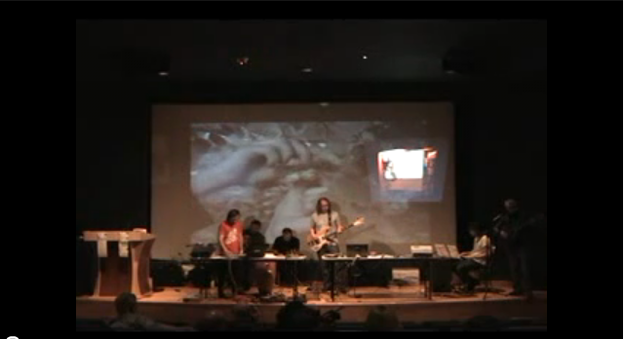Prefacing a new book on E-Poetry
On the tenth anniversary of the Electronic Poetry Festival

E-Poetry [2011]: International Digital Language | Media | Arts Festival
E-Poetry [2011]: International Digital Language | Media | Arts Festival
I’m completing this book having recently participated in the 2011 E-Poetry Festival. For my own part, as a performer, I assembled a panhemispheric musical group named grope uSurp, comprised of other multimedia artists and friends attending the festival; Lucio Agra, John Cayley, Stephen Cope, Andrew Klobucar, Siew-wai Kok, and Eugenio Tisselli joined me onstage. One of our pieces, proposed by Cayley, remade a Neil Young lyric (“Albuquerque”) that was particularly apt to the gathering. In one verse Cayley sings, “I’ve been flying / through the code / Words are starving / to loose their hold” (E-Poetry). This sensibility happened to echo observations presented in my talk at the event (“Bearing the Fruits of E-Poetry: A Personal Decennial View”), which describes how my 2001 E-Poetry band “9 way mind” strove to emphasize language in its performance, whereas this year’s band’s preparations largely focused on using MIDI technology to compose images and language interactively — a transition indicative of the aesthetic course the field as a whole has taken. In the period between the first (2001) and most recent E-Poetry festivals, a shift in the prominence of language occurred. Authors present language — indeed, each work discussed in this book and at the Festival features words — but verbal components are today fully balanceable with mediated components. In programmatic compositions such as those permitted by computers and on the WWW, words hungrily invite, and may require, extratextual supplementation to thrive. In this new poetic paradigm, words do not surrender their power, but share it with other expressive elements. Reading now happens on multiple registers.
I anticipated attending E-Poetry might bring apprehension, a type of crisis to my research — that a new slew of dynamics might be unleashed, deviating beyond contexts I consider for the genre. They did not. New applications, tools, and skillful, energetic combinations of forms presented at the Festival were all very exciting. Yet I left E-Poetry 2011 charged with understanding, with a sense that digital poetry, as presented on the WWW, has reached a necessary plateau. A stage replete with exploration and variations of form that test and perpetually reestablish boundaries. A juncture at which the essential points of departure are — while variable and interchangeable — evident, that will remain in place as long as the technologies supporting them are upheld. Inevitably a new phase will arrive, and the dynamics identified in this study will fold into new dynamics held by shifts in hardware, software, and network technology.
What conditions will incite movement away from this particular epoch? Presumably it will include device-based developments, a trend which may have already begun. As portable devices move away from the PC/laptop model, creative applications developed specifically for global satellite networks, made with tools not congruous with those used for WWW production, may change the face of digital poetry. Proprietary delivery mechanisms (i.e., hardware) already prohibit viewing entire swaths of work germane to digital poetry at present (e.g., Apple refuses to enable use of Flash players on iPhones and iPads). New devices may or may not be inclined to incorporate technologies compatible to those used on today’s WWW, and the likelihood of tomorrow’s devices rendering today’s processes and productions obsolete is near certain.
We have enjoyed a specific and special moment in the genre’s continuum, more than a decade of its arrival on a global, multimedia computer network. Its ephemerality — knowing E-Poetry as such will not be here forever — encourages me explore what works consist of, and show ways of reading them.